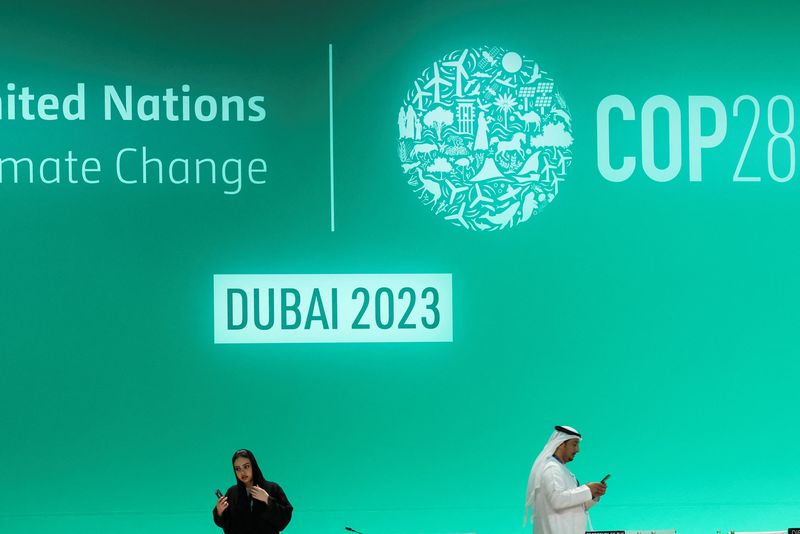By Valerie Volcovici
(Reuters) - Nations struck a historic deal on Wednesday at the COP28 climate summit in Dubai to transition the global economy away from fossil fuels. But some delegations and environmental groups say it contains major loopholes that could keep oil, gas, and coal flowing indefinitely.
CARBON CAPTURE
One of them is the inclusion of a phrase calling for accelerated deployment of carbon capture.
Carbon capture is a technology that would theoretically allow users of oil gas and coal to keep their emissions from reaching the atmosphere by capturing them at the source, and storing them permanently underground.
Lots of people are skeptical about carbon capture. It is expensive and has yet to be proven at the scale needed to impact climate change. And environmental groups call it a false flag that justifies continued drilling.
On the other hand, if it ever did manage to get off the ground, it would allow for ongoing production and consumption of fossil fuels, presumably without a climate impact.
That does not sit well with some countries – especially those most vulnerable to the impacts of warming.
"We are being asked to endorse technologies that could result in actions that undermine our efforts," said Anne Rasmussen, lead negotiator of the Alliance of Small Island States.
The pact also pushes for the acceleration of low-carbon hydrogen - which typically means hydrogen produced by electrolyzing water in a process powered by clean-energy sources like solar and wind. Practically none of this is made today because it is so expensive.
TRANSITIONAL FUELS
The deal also includes the line that the summit "recognizes that transitional fuels can play a role in facilitating the energy transition while ensuring energy security."
What are transitional fuels? Well, they are fossil fuels.
US Special Climate Envoy John Kerry said at a press conference on Wednesday that his definition of transitional fuels is natural gas, produced in such a way that its greenhouse gas emissions are captured during production.
He said that all the provisions of the COP28 deal have to be in line with the international target of limiting global warming to 1.5 C above pre-industrial times.
"That means they're going to play either a limited role or temporary role, while you're largely phasing out fossil fuels in the system over a period of time," he said.
Environmentalists do not like it. They are worried that language like this will encourage ongoing investment in oil and gas development.
Gas has been a tricky topic since Russia’s invasion of Ukraine last year, because the Ukraine War has triggered a massive increase in European imports of U.S. liquefied natural gas.
SORRY, WHICH SYSTEMS?
Another area of concern raised by observers is a clause calling upon parties to transition away from fossil fuels "in energy systems" – as opposed to across the entire economy.
This, says the International Pollutants Elimination Network, sends a signal that other energy-intensive sectors like plastics and petrochemicals production can continue to rely on fossil fuels.

Negotiations around a separate treaty on plastic pollution are split around whether countries should tackle pollution from the production side of the plastics’ life cycle, drawing opposition from countries like Saudi Arabia.
Norway’s foreign minister, Espen Barth Eide, told Reuters that the deal means "there might be a small space for a major fossil fuels, but that will be in the hard-to-abate sectors."